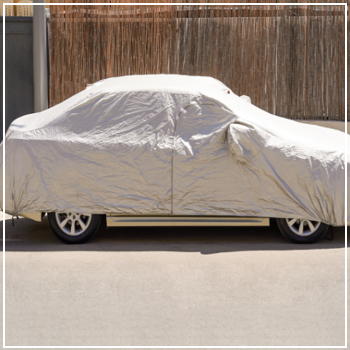 If you don't own a garage or prefer to park your car outside, a car cover can be a lifesaver for protecting your vehicle's finish. However, buying a car cover isn’t as simple as just grabbing one off the shelf—some research is necessary. Not all car covers are created equally, and not all are suitable for outdoor use. Poorly chosen materials could end up damaging your car's paint rather than safeguarding it.
If you don't own a garage or prefer to park your car outside, a car cover can be a lifesaver for protecting your vehicle's finish. However, buying a car cover isn’t as simple as just grabbing one off the shelf—some research is necessary. Not all car covers are created equally, and not all are suitable for outdoor use. Poorly chosen materials could end up damaging your car's paint rather than safeguarding it.
When it comes to car covers, the quality and type of material play a huge role in how effective they are at shielding your vehicle. If you're storing your car outside, it's crucial to pick a cover designed specifically for that purpose. Indoor covers, while cheaper, usually lack the durability and UV-blocking properties needed to protect your car from harsh outdoor conditions. Outdoor covers, on the other hand, are crafted from more robust materials such as polyester or canvas, often with treatments to repel water and block UV rays. Some even come with soft linings to avoid scratching the paint, though certain models include grommets that could potentially cause scratches or dents if not used carefully.
When shopping for an outdoor car cover, you'll find three main types based on fit:
- Universal Covers: These are budget-friendly options that offer basic UV protection. However, since they aren't tailored to your specific vehicle, they may not fit snugly and can easily blow away in strong winds.
- Semi-Custom or Contour Fit Covers: These provide a closer match to your car's dimensions, offering better coverage without the need for extensive tailoring.
- Custom Covers: Made specifically for your vehicle, custom covers ensure a perfect fit, especially useful for older or unique models that might not work well with standard sizes.
Once you’ve got the right cover, it should deliver several key benefits:
- UV Protection: Long-term sun exposure can degrade your car's paint and cause internal components to crack. A good car cover will shield against these effects, reducing the need for frequent touch-ups.
- Weather Protection: Heavy-duty covers deflect rain, hail, and wind, preventing watermarks and scratches. They also help keep your car cleaner by blocking dirt, bird droppings, and tree sap.
- Theft Deterrent: Securing your cover with locks makes unauthorized access more difficult, deterring thieves and vandals.
However, even the best car covers can harm your vehicle if not selected or used properly. A poorly fitting cover can flap around in the wind, exposing your car to the elements and possibly scratching it with its edges. Additionally, if the cover traps moisture inside, it can promote rust and mold growth. Breathability is essential; while waterproof covers are great for extreme weather, water-resistant ones are usually sufficient for most situations.
Suppose your car's exterior has already taken a beating from the elements. In that case, it’s time to bring it to DaSilva’s Auto Body to restore its shine and ensure it stays protected moving forward. Contact us today to book an appointment and give your car the care it deserves!
Drill bits are cutting tools used to remove material to create holes, almost always of circular cross-section. Drill bits come in many sizes and shapes and can create different kinds of holes in many different materials. In order to create holes drill bits are usually attached to a drill, which powers them to cut through the workpiece, typically by rotation. The drill will grasp the upper end of a bit called the shank in the chuck.
Drill bits come in standard sizes, described in the drill bit sizes article. A comprehensive drill bit and tap size chart lists metric and imperial sized drill bits alongside the required screw tap sizes. There are also certain specialized drill bits that can create holes with a non-circular cross-section.
Drill Bits,Drill Bit Set,Drill Bit Types,Diamond Drill Bit
Shenyang Lubang Railway Maintenance Machinery Co.,Ltd. , https://www.srmfrailwayequip.com